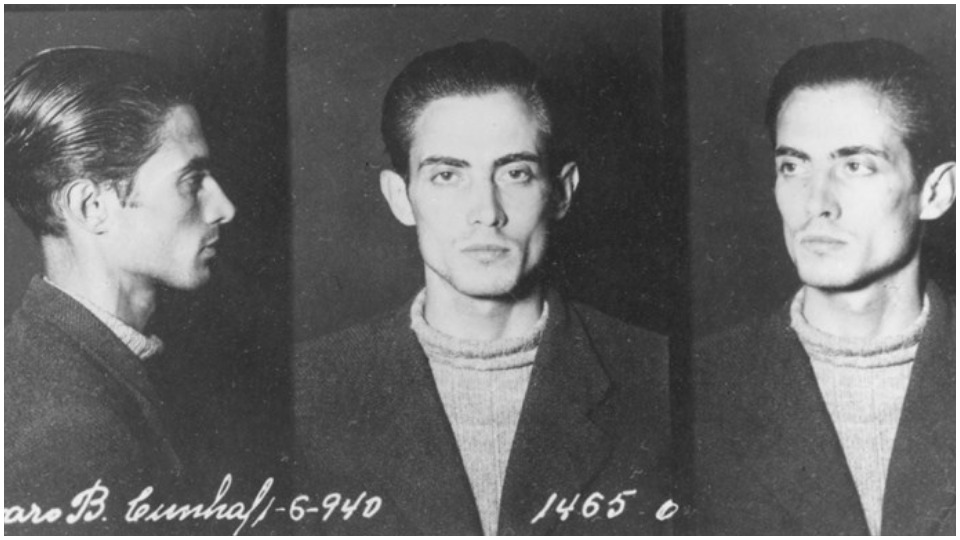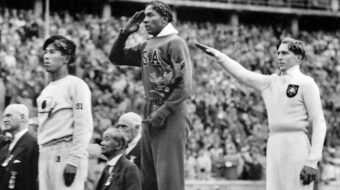
There are only a few Communist Parties in the western world that can claim to have fought a decades-long underground battle against an actually-existing fascist regime and survived. Among them is the storied Portuguese Communist Party. From 1932 to 1974, Portugal was ruled by the nationalist and conservative regime of dictator António de Oliveira Salazar.
His Estado Novo (New State) government relied on extensive censorship and extreme political repression—especially against labor unions and workers’ organizations, and particularly the Communist Party. During the Spanish Civil War, Salazar backed Francisco Franco’s fascists. And when many of the old colonial masters of Europe were granting independence in the postwar period, Salazar maintained Portugal’s grip on its far-flung African and Asian possessions.

The novella Five Days, Five Nights, newly published by International Publishers, was written by Portuguese Communist leader Álvaro Cunhal, under the pseudonym Manuel Tiago, in the late 1950s while he was imprisoned by Salazar’s secret police. The short book details a young man’s journey through the countryside and villages, dodging the police, as he seeks to escape across the Spanish border. The story first appeared in Portuguese in 1975 after the fall of the dictatorship; International Publishers’ 2020 release is the first English edition.
I recently sat down with Eric A. Gordon, our People’s World cultural editor, who initiated the effort to share Cunhal’s fictional work with the English world and carried out the translation from Portuguese. Our contributing writer Michael Berkowitz earlier wrote a discerning and appreciative review for us. In this interview, we discuss how the English edition of Five Days, Five Nights came to be.
People’s World: Our readers know your work as a cultural critic primarily, although you do branch out into reporting on politics, religion, travel, gender issues, and other subjects. So to start off, let me ask you, how did you come to be so fluent in Portuguese?
Gordon: Well, to be clear, I don’t consider myself so fluent in Portuguese, but the principal requirement of a translator is to be facile and expressive in their own language! But yes, I do have a long academic background in both Spanish and Portuguese dating back to my Latin American Studies major in both undergraduate and graduate schools. I later went on in history for a doctorate, and both my master’s thesis and Ph.D. dissertation took on phases of Brazilian history. So I had lots of opportunity to read Portuguese, and also to speak it daily on extended research trips to both Brazil and Portugal. With the help of various dictionaries, both printed and online, and native Portuguese speakers I know, I have access to concepts, words, and expressions that are unfamiliar to me.
This is not the first book I’ve translated from Portuguese. A few years ago I translated Waving to the Train, the fictionalized memoir in story form by a Jewish Brazilian writer with a fascinating life—born in Poland, lived in the USSR during WWII, the DP camps after the war, immigration to Israel, and then at the age of 20 she wound up in São Paulo for 55 years before moving to L.A. Over time, Portuguese became the language she was most comfortable writing in.
Five Days, Five Nights is available from International Publishers.
PW: Why as a translator did you choose this book by Manuel Tiago?
Gordon: As we make clear in the book, “Manuel Tiago” is the pen-name for Álvaro Cunhal, who was the longtime leader of the Portuguese Communist Party. He had spent years in the underground movement under fascism, ten years in a Portuguese high-security prison (from which he escaped, by the way, in 1960), and over a decade in exile. He returned to Portugal as a hero in 1974 after the revolution that overthrew fascism, and entered the coalition government as a Communist. It’s a remarkable biography.
But what most people didn’t know, until he revealed it late in life, is that apart from his political writing, he was also a talented fiction writer whose nine books—novels, novellas, and stories—were published by Edições Avante!, the PCP’s imprint. When I became aware of this, I contacted them and found out that none of his works had been translated into English, and that intrigued me. I figured if an individual with that kind of personal history took that kind of time out of his life to write fiction, and all his books were published, there must be a great deal of worthwhile material in that body of work—inaccessible, however, to English readers. I asked them which of his works they would most like to see in English, and they sent me this title, one of their most consistent best-sellers in Portuguese, which was actually made into a feature-length film.
PW: This is the first book in a series, right?
Gordon: Yes. Avante! published nine volumes of his fiction, but a couple of them are quite short—novellas, really, like Five Days, Five Nights. So my thinking right now is to combine one of them with another book of three stories, turning it into a collection of four. So we have eight planned in all.
I now have them all in my hands, but I haven’t read them all yet. I’m just taking them one at a time. The next one International Publishers will release is The Six-Pointed Star, which is, in my opinion (I’m prejudiced, of course), one of the most memorable fictional works in world literature about prison. It juggles genres quite brilliantly, I think, between novel, memoir, and an anthology of stories, a lot of little episodic portraits of loosely related characters one could meet in a high-security Portuguese prison in fascist times, and their interactions both with each other and with the outside world.
After that will be the collection of four stories that I mentioned, which, although they are discrete stories without repeating characters, in the order we place them, will more or less trace the evolution of political consciousness in resistance to fascism, and the final story is a murder mystery! Following that is a collection of stories all on the theme of borders, or more precisely border crossings—clandestine, naturally, during those times.
I’m saving his monumental, over 500-page-long novel Até amanhã, camaradas (Until Tomorrow, Comrades) for last. It was made into a Portuguese TV miniseries, and possibly could be considered Cunhal’s best work. Before I tackle it, I want to make sure I’m well versed in his language and style.
PW: So why would readers in English be interested in him? Is he a great world writer who, maybe because of his politics, never got the recognition he deserved?
Gordon: That’s a good question! I’ll try to answer as honestly as possible—and hope it doesn’t hurt book sales! I’m not sure I would say he’s a “great” writer ranked with the brightest luminaries of world literature, but definitely I would say an important writer. I’m going to upstage some possible future critics and reviewers and state my opinion, that Manuel Tiago is uneven in terms of always paying sufficient attention to character development. Even though in some books—like Five Days, Five Nights, for example—he shows us his mastery when he sets his mind to it. In a few of his stories, he drifts into some of the standard formulas of Socialist Realism, you know, righteous-thinking, heroic, flawless proletarian leaders who can do no wrong and sacrifice so much, and so thanklessly, for the cause. But in most cases, it’s a pretty healthy mix of a profound knowledge of human character, with all our foibles, with the artist’s obligation to write about dedicated, optimistic people with a strong sense of purpose.
But here’s why I say he’s important, apart from how history will eventually judge him as a literary figure. Because what he writes about is something few others tackle—life under extreme conditions of repressive fascist oppression, and how resisters organize and live to see another day. The opposition to Portuguese fascism lasted as long as the regime itself, from 1927 to 1974. How do people survive, how do they act to improve conditions, how do they effect change, how do they deal with setbacks, how do they work from within, how do they pass on the habit and tradition of resistance from generation to generation? I cannot think of another writer who, with such granular attention to the specifics of day-to-day clandestine party work, lays out through their collected oeuvre such a vast collective portrait of a whole nation in struggle against such entrenched evil. There is a great deal that is pleasurable to read in his work from the storytelling point of view, but beyond that, his work is instructive and illuminating for the whole process of resistance in whatever country at any time.
And now I’ll answer a question you haven’t asked: Why am I so passionate about this eight-book project? Well, I’m at a point in my life when I really think a lot about how much time I have left, not just years, but mental agility and energy. Because of my Portuguese background, and my political leanings, I just figured there’s no one else besides myself in quite the same position to undertake these translations. If there is, then where have they been hiding all these years? So for me it’s kind of a calling, something I need to do before it’s too late. And frankly, I do want to live long enough to get some sense of how these books are being received. I am, of course, extremely gratified that International Publishers is on the same page with me in this venture, bringing these books into existence that readers will always have at their fingertips if they want them.
PW: You’ve been active in the LGBTQ movement at different times in your life, you’ve written about it, and you openly identify as a gay man. Just curious, does Manuel Tiago get into such issues at all? Cunhal, after all, was pretty mid-20th-century, old-school, Soviet-oriented Communist in his politics.
Gordon: I’ll answer that in a second, but I’m glad you mentioned his pro-Soviet orientation, because in a number of the books I’ve read so far, he doesn’t shy away from giving us characters who travel to the USSR or other socialist-bloc countries for training courses, sometimes even in subjects like guerrilla warfare, and of course, employing false passports, disguises, and illegal border hopping. It’s one way of showing his indebtedness to the positive, practical assistance the Soviets gave to liberation movements all around the globe, including to those in fascist Europe. This particular case is so interesting—the Soviet Bloc was helping out the resistance in both the mother country and its colonies at the same time! I hope humanity never forgets that, despite whatever of a negative nature that can also be said (particularly on the LGBTQ question) about that first experiment in socialism.

As to your question: Yes, it does come up a little, at least so far in my reading. Certainly in the prison memoir I mentioned, which is next up in the series. On the face of it, wouldn’t it seem awfully prissy for a writer of gritty prison fiction not to touch on that aspect of prison life? I think it actually comes up, but very subtly, in Five Days, Five Nights, too, in the intense relationship between the two central male characters—one older, tougher, muscular, inexhaustible, and decidedly heterosexual, the other a soft 19-year-old with little life experience, a great deal of sexual naïveté, and in some readings possibly of indeterminate sexuality. In any case, Manuel Tiago did not seem scared of approaching this part of life, especially considering the period he was writing about and in which he was writing.
PW: I notice that the illustrator’s name is Ilse Gordon. Any relation?
Gordon: Yes, Ilse is my younger sister, a very accomplished artist and teacher. I hope this isn’t too much personal information, but this project actually came along at a very difficult time. Our older sister Nina died in August 2019, suddenly, so our whole family was still in a state of shock over that. As often happens, an event like that brought the three remaining siblings closer together. I thought if International Publishers were open to having her work with me on this book, it would be a nice thing to create together. As she was researching and creating her drawings, her husband, Dr. Neil Shapiro, was receiving treatment for an exotic, fast-moving cancer that didn’t respond to a succession of protocols. As Ilse was working on the drawings, Neil helped her research the period dress, vehicles, uniforms, and also modeled for her in certain poses that she asked for. Distraught as she was about the eventuality of losing her husband of almost 40 years, she was also grateful for the opportunity to work her craft and skill into a book people would soon be able to hold in their hands. The book appeared six months after he died.
PW: Sorry if that prompted so many sad memories….
Gordon: Thank you, but really, what is so moving to me in the end is knowing, through the books of Manuel Tiago/Álvaro Cunhal, how protracted the struggle can be, and how many people we lose along the way, yet those who work for freedom are tirelessly persistent and we can never give in or give up. That’s what I take away from this work.













Comments